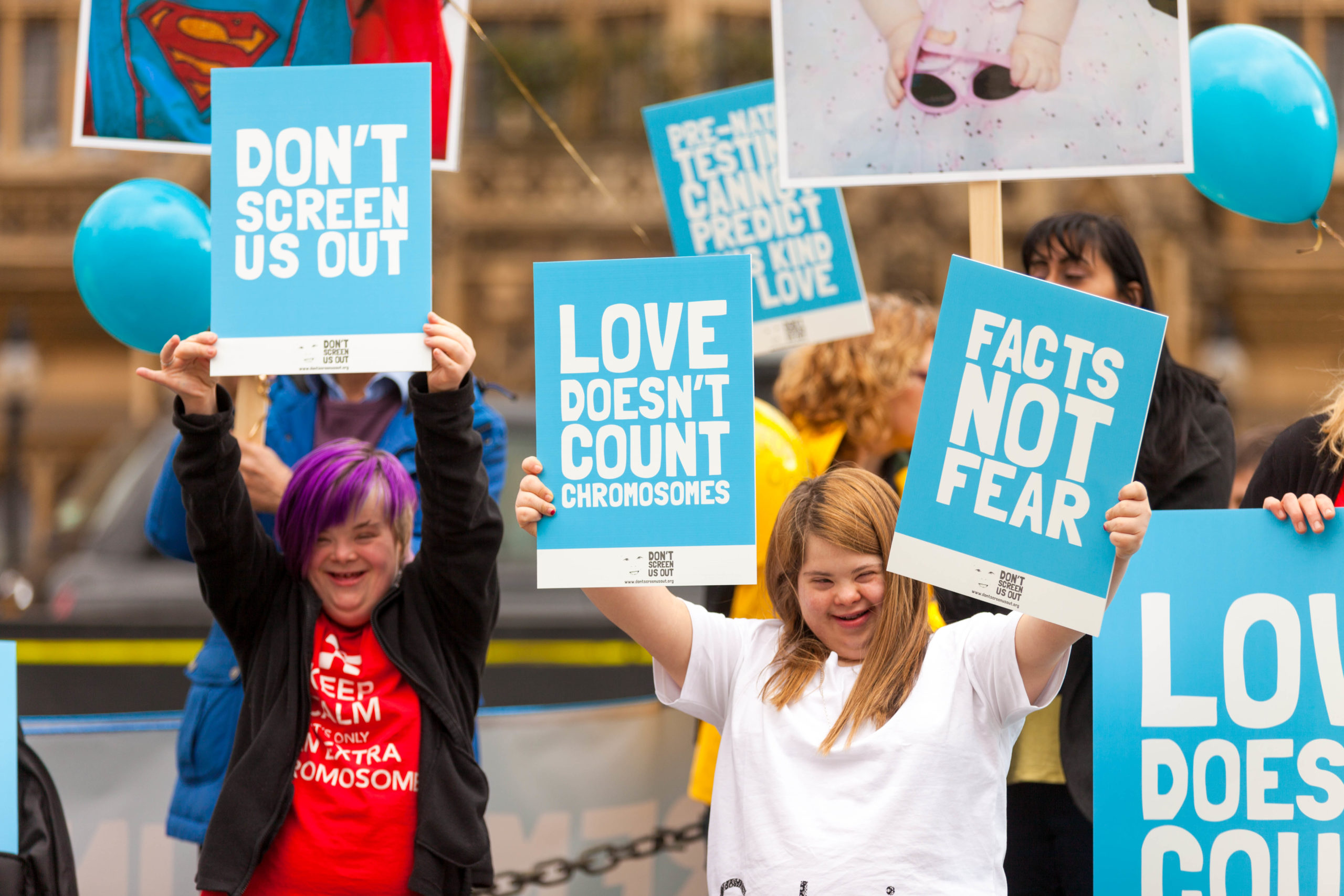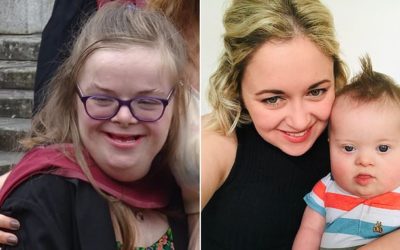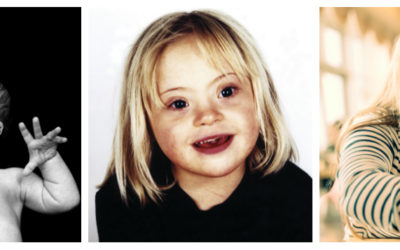Successful Don’t Screen Us Out demonstration highlights discriminatory consequences of new prenatal screening, and underscores need for Down’s syndrome voices to be heard
Individuals with Down’s syndrome and their families led a rally outside Parliament today, affirming the dignity and happiness that people with disabilities can enjoy, and protesting proposals to introduce a discriminatory new screening technique which is expected to lead to a profound reduction in the number of children born with Down’s syndrome.
Those gathered were calling on the Government to increase support for people with Down’s syndrome, their families and ensuring the provision of balanced information for parents with a pregnancy diagnosis of Down’s syndrome.
The rally included speeches from people with Down’s syndrome, parents and leaders from key Down’s syndrome advocacy groups. Bridget Jones’s Diary and Miranda star Sally Phillips, who has a son with Down’s syndrome, spoke via a pre-recorded special message for those attending, due to Midsomer Murders filming commitments.
The new technique called ‘cell-free DNA’ testing is being heralded as a move to reduce the number of miscarriages associated with invasive amniocentesis, with a National Screening Committee pilot study predicting that it would result in 25 fewer miscarriages per year.
Yet proponents of the test have glossed over the fact that the same pilot study predicts that the new screening will detect 102 more babies with Down’s syndrome every year. Based on the current 90% of pregnancies that are aborted following a diagnosis, this would mean an increase of 92 abortions for Down’s syndrome annually.
That reduction equates to an overall decline of Down’s syndrome live births by 13% and would lead to a corresponding reduction in the number of people with the condition in the UK. Such an outcome is likely to have a profoundly negative impact on the community of people with Down’s syndrome.
A recent UN report from the International Bioethics Committee of the United Nations Educational, Social, and Cultural Organisation has issued a stern warning about the drive to adopt NIPT in national screening programmes. The proposal also violates the UK’s treaty obligations to the UN Convention on the Rights of Persons with Disabilities (CRPD) to make sure that its health policies – including antenatal screening – are informed by and reflective of a ‘social model’ understanding of disability.
Sally Phillips, Bridget Jones’s Diary and Miranda star, who has a son with Down’s syndrome, said:
“It’s so important that we bust these myths about Down’s syndrome and that we get rid of all the out of date information that is out there… For too long the government have acted as if our lives don’t matter but… Be encouraged! There is a chance that things might change.”
Lynn Murray, UK lead for Saving Downs and spokeswoman for the www.dontscreenusout.org campaign, said:
“We call on Jeremy Hunt to reject proposals to introduce these new tests. As a parent of a teenage daughter with Down’s syndrome, I’ve had 16 years of seeing the effects of screening on the lives of people with Down’s syndrome and their families. These new tests will make this situation worse, not better. The UK government should be putting its energy behind providing real support for our families and other parents who are expecting a child with Down’s syndrome.”
Christine Elliot, spokeswoman for the Down Syndrome Research Foundation, said:
“We face the biggest challenge for the existence of anyone who will ever be diagnosed with Down’s syndrome. The promise of innovation in the new NIPT test are nothing of the sort for unborn people with DS, it will be their certain demise in 9 out 10 pregnancies. Solely due to a diagnosis that is commonly delivered in an outdated and fear mongering manner. We call upon all people to reject this normalised discrimination that has been accepted without thought or question.”
Sarah Hoss, spokeswoman for Future of Downs, said:
“It is important that families are provided with support and up to date information about the condition so that they feel empowered to make informed choices when it comes to undergoing tests and not feel pressurised into having terminations when a trisomy is identified during pregnancy. Many of us also feel that the abortion limit should be the same for all babies and not be allowed up until full term as the law currently allows. Many parents feel that the focus on testing and terminations makes life more difficult for them if their new their baby has a trisomy. Personally I believe that people with Down’s make for a more diverse society and that people with DS require respect and support to become more independent and live satisfying lives. The life expectancy of people born now with DS is similar to the general population. People with DS and their families need to be heard and contribute to the decision making around tests and the government needs to hear what we are saying.”
Maggie Hart, spokeswoman for The Education Centre for Children with Down’s Syndrome, said:
“No life is more precious than the other. There is an assumption that Down syndrome could be eradicated – a scary thought to think where this will end.”
ENDS
For more information on the cfDNA screening proposals and concerns about them see the campaign briefing on our website, and see our more detailed FAQ.
For media inquiries, please contact:
- Lynn Murray – UK lead for Saving Downs and Don’t Screen Us Out spokeswoman – (+44) 01313340133, email: info@dontscreenusout.org
-
Christine Elliott – Head of the Down Syndrome Research Foundation – (+44) 07910760015, email: celliott@dsrf-uk.org
-
Sarah Hoss – Spokeswoman for Future of Downs – (+44) 07949087111 email: hoss.sarah@gmail.com
-
Maggie Hart – Founder of The Education Centre for Children with Down’s Syndrome – (+44) 07806 707465, email: maggie.hart@eccds.org.uk



